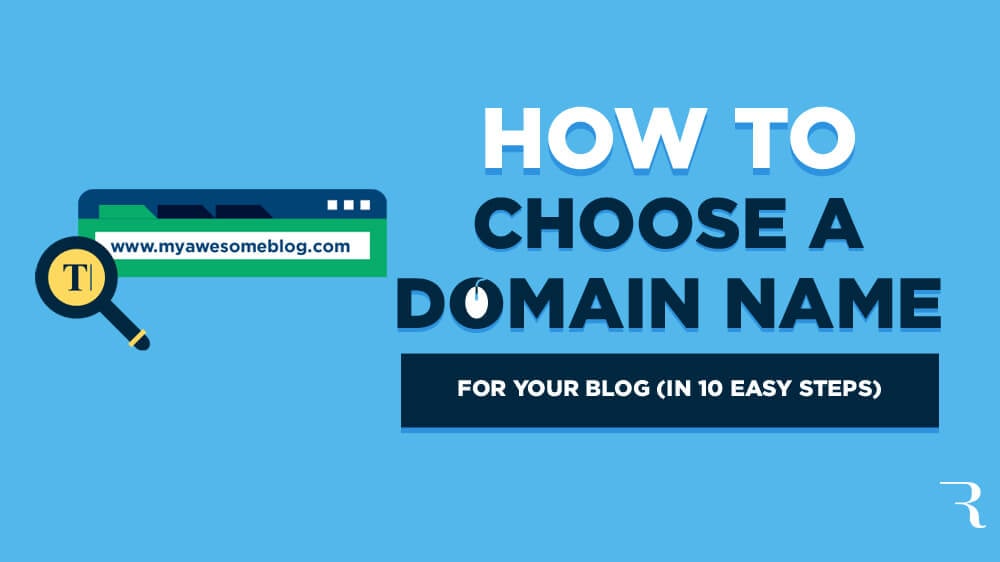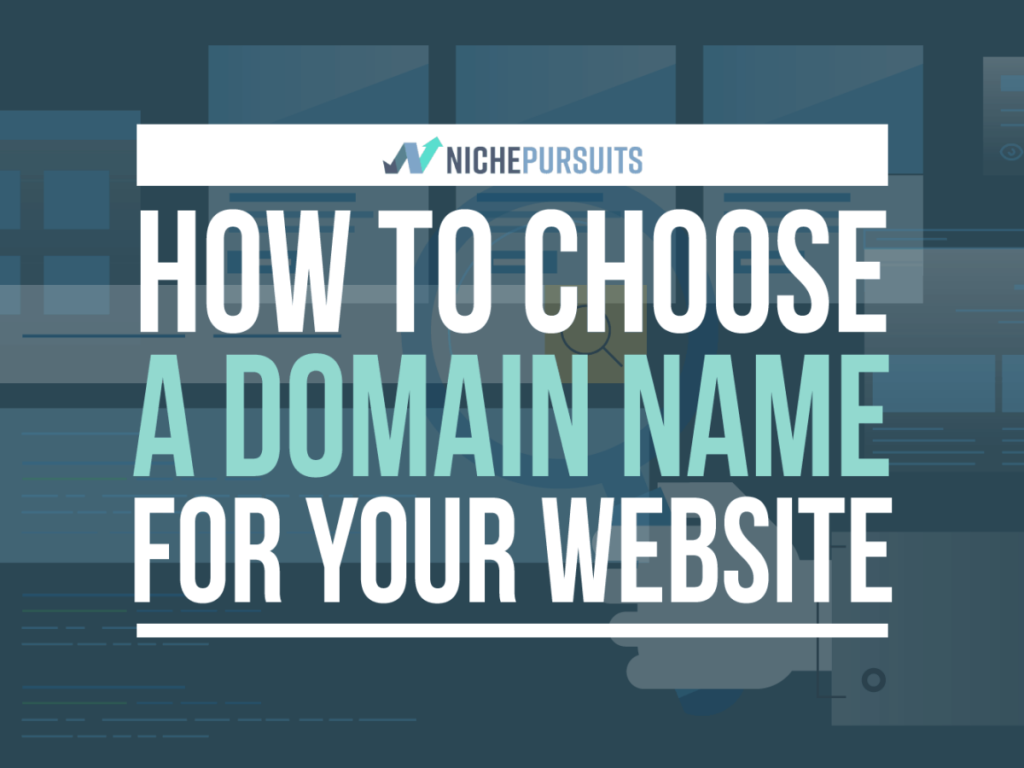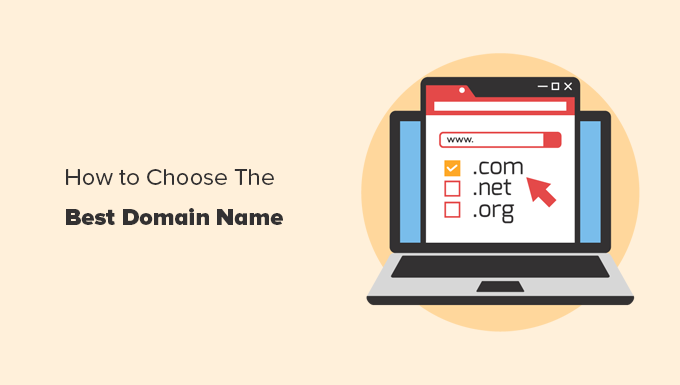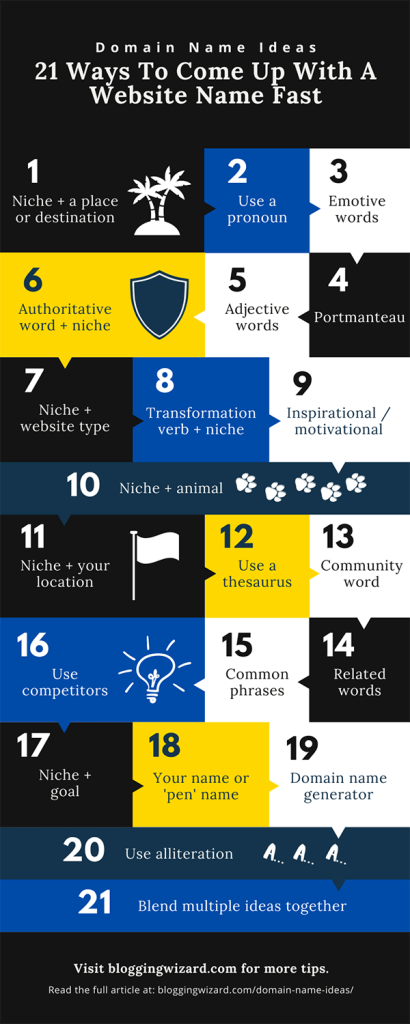When it comes to choosing a domain name for your niche site, there are a few key factors to consider. Firstly, it’s important to select a name that is short, memorable, and easy to spell. This will ensure that potential visitors can easily find and remember your site. Secondly, it’s crucial to choose a name that reflects the purpose and theme of your niche site. This will help attract your target audience and give them a clear idea of what to expect when visiting your site. Finally, it’s wise to avoid using numbers, hyphens, or other symbols in your domain name, as these can make it harder to remember and type correctly. By following these simple tips, you can choose a domain name that will effectively represent your niche site and attract the right audience.

This image is property of www.ryrob.com.
Consider Your Niche
When choosing a domain name for your niche site, it is essential to consider your niche carefully. Your domain name should reflect the nature of your business and align with the industry you are targeting. Take some time to think about what sets your niche apart from others and how you can convey that through your domain name.
Identify Your Target Audience
Before selecting a domain name, it’s crucial to identify your target audience. Understand who your ideal customers are and what they are looking for. This will help you come up with a domain name that resonates with them and grabs their attention. Consider their interests, values, and preferences when brainstorming ideas.
Research Your Competitors
Researching your competitors is an integral part of choosing a domain name. Analyze the domain names of your competitors and identify what works and what doesn’t. Look for patterns or trends within your niche and consider how you can differentiate yourself. By understanding your competitors’ domain names, you can find inspiration for your own unique and memorable domain name.
Define Your Unique Selling Point
Your unique selling point (USP) is what sets you apart from your competition. It could be a unique product or service, exceptional customer service, or a specific expertise. Once you have defined your USP, incorporate it into your domain name. This will help potential customers recognize what makes your niche site special and compelling.
Keep It Short and Simple
When it comes to domain names, simplicity is key. A domain name that is short and easy to remember will make it effortless for users to find and share your site. Here are some tips to keep it short and simple:
Avoid Lengthy Domain Names
Long domain names are not only difficult to remember but also prone to typos. Aim for a domain name that can be easily typed and shared. Ideally, you should keep your domain name under 15 characters to ensure memorability.
Choose Easy-to-Spell Words
Using simple and easy-to-spell words in your domain name will help users find your site without any confusion. Avoid complicated or ambiguous words that may lead to misspellings or misunderstandings.
Minimize Numbers and Hyphens
Including numbers and hyphens in your domain name can make it more confusing and harder to remember. It’s best to stick with letters only to create a user-friendly and professional domain name.

This image is property of www.nichepursuits.com.
Make It Brandable
Your domain name is a crucial part of your brand identity. It should be memorable, unique, and easily associated with your niche site. Here are some tips to make your domain name brandable:
Think Long-Term Branding
Choose a domain name that can grow with your business. Consider the future direction of your niche site and ensure that your domain name still aligns with your brand even as you expand or evolve.
Create a Memorable Name
A memorable domain name is more likely to stick in people’s minds. Use catchy words, alliteration, or other linguistic devices to make your domain name stand out. The more memorable your domain name, the more likely users will visit and revisit your site.
Consider Logo and Design Implications
When selecting a domain name, think about how it will look when incorporated into a logo or design. Ensure that the domain name can be visually represented in a compelling and aesthetically pleasing way. This will strengthen your brand identity and make it easier for customers to recognize and remember your site.
Consider Keyword Relevance
Keywords play a vital role in enhancing your website’s visibility in search engine results. Here are some considerations for incorporating keywords into your domain name:
Research Relevant Keywords
Conduct keyword research to identify the most relevant keywords for your niche site. Understand the terms and phrases that potential customers are using to search for products or services in your industry. This will help you choose a domain name that reflects the nature of your business and increases the chances of ranking higher in search engine results.
Incorporate Keywords Naturally
While it’s important to include relevant keywords in your domain name, it’s equally vital to do it naturally. Avoid stuffing your domain name with keywords to the point where it becomes awkward or spammy. Your domain name should be concise, catchy, and still make sense to users.
Avoid Exact Match Domains
Exact match domains, where the domain name exactly matches the keyword you are targeting, were once popular for SEO purposes. However, search engines have evolved, and they now prioritize user experience and quality content. It’s better to focus on creating a memorable and unique domain name rather than solely relying on an exact match.

This image is property of www.wpbeginner.com.
Check Availability and Trademarks
Before finalizing your domain name, it’s crucial to check its availability and ensure that no trademarks exist that could lead to potential legal issues. Here’s what you need to do:
Use Domain Availability Tools
There are various domain availability tools available online that can help you check if your desired domain name is available for registration. These tools will also suggest alternative domain names if your first choice is already taken. Make sure to explore different extensions (.com, .net, .org) and consider other variations or related terms.
Search for Existing Trademarks
To avoid legal issues down the line, search for existing trademarks that may conflict with your chosen domain name. This can be done through the trademark databases of your country or by consulting a trademark attorney. It’s important to ensure that your domain name doesn’t infringe on any existing trademarks to protect your brand and avoid potential lawsuits.
Avoid Potential Legal Issues
Even if a domain name appears to be available, be cautious of any potential legal issues surrounding it. Some domain names may be associated with copyrighted material, licensed products, or restricted terms. Conduct thorough research to ensure your domain name does not violate any laws or regulations.
Choose a Trustworthy Extension
The domain extension you choose plays a significant role in shaping users’ perceptions and trust in your niche site. Here are some factors to consider when selecting a domain extension:
Consider .com as a Default Choice
While there are numerous domain extensions available, .com is still the most widely recognized and trusted extension. It carries a sense of credibility and familiarity for users. If possible, prioritize securing a .com extension for your domain name. However, if your niche site caters to a specific country or industry, the country-code TLD (.us, .co.uk) or industry-specific TLD (.photography, .tech) may be more appropriate.
Explore Niche-Specific Extensions
Depending on the nature of your niche site, there may be specific domain extensions that can enhance your branding. For example, if you are running a site related to photography, a .photography extension could be more relevant and memorable. Explore niche-specific extensions that align with your industry and the image you want to project to potential customers.
Avoid Potentially Misleading Extensions
Some domain extensions may lead to confusion or misinterpretation. Avoid using extensions that can create uncertainty or misalignment with your brand. For example, a .biz extension might not be the best choice if you want to convey a sense of professionalism and trustworthiness.

This image is property of websitesetup.org.
Ensure Easy Memorability and Pronunciation
A domain name that is easy to remember and pronounce contributes to better brand recognition and word-of-mouth referrals. Here’s how to achieve memorability and pronunciation:
Avoid Complex or Unfamiliar Words
Using complex or unfamiliar words in your domain name can make it difficult for users to remember or pronounce correctly. Keep your domain name simple, using easily understood vocabulary that resonates with your target audience.
Use Phonetically Simple Combinations
Opt for combinations of words that are phonetically simple and flow well together. This makes your domain name easier to pronounce and remember. Rhyming, alliteration, or catchy phrases can also make your domain name more memorable and appealing.
Consider Testimonials and Feedback
To ensure your domain name is both memorable and pronounceable, consider asking for feedback from friends, family, or potential customers. Their input can provide valuable insights on how your domain name is perceived and whether it leaves a lasting impression.
Apply SEO Considerations
While SEO considerations are not the only factors in choosing a domain name, they can positively impact your niche site’s visibility in search engine rankings. Here’s what to keep in mind:
Include Relevant Keywords
Incorporating relevant keywords into your domain name can help improve your site’s visibility in search engine results. However, ensure that the keywords flow naturally within the domain name and do not compromise its clarity or memorability.
Avoid Exact Match Anchor Text
When building backlinks to your niche site, avoid using your exact domain name as the anchor text in every instance. Vary the anchor text by using related keywords, your brand name, or other descriptive phrases. This diversification will strengthen your SEO strategy and avoid appearing manipulative to search engines.
Prioritize User Experience
While SEO is important, prioritize user experience when selecting a domain name. A user-friendly and intuitive domain name will attract and retain visitors on your site, ultimately leading to better rankings as search engines recognize its value. Consistently providing a positive user experience will also encourage users to share and recommend your niche site.

This image is property of bloggingwizard.com.
Think Globally
If your niche site has the potential to attract an international audience, it’s crucial to consider global implications when choosing a domain name. Here’s what to keep in mind:
Consider International Audiences
Evaluate if your niche site caters to an international audience or has the potential to expand globally. If so, select a domain name that can be easily understood and recognized across different languages and cultures. Steer clear of domain names that may have negative connotations or cause misinterpretations in various regions.
Avoid Geographically Restricted Domains
Unless your niche site is primarily targeting a specific country or region, it is advisable to avoid geographically restricted domain extensions. For instance, a .us domain extension may limit your site’s appeal to an international user base. Opt for more generic extensions like .com, .net, or .org to project a global image.
Validate Cross-Cultural Interpretations
To ensure your domain name translates well across different cultures, seek feedback from individuals familiar with various languages and customs. This will help you identify and avoid any potential cultural or linguistic misunderstandings. Conducting thorough research and validation can save you from making costly mistakes.
Protect Your Brand
When selecting a domain name, it’s important to consider your brand’s overall identity and protect it from potential misuse. Here are some steps to take:
Secure Matching Social Media Handles
Consistency across online platforms is essential for building a strong brand presence. Before finalizing your domain name, check the availability of matching social media handles. Securing handles that mirror your domain name will help establish brand recognition and prevent others from misrepresenting your business.
Register Common Misspellings
To further safeguard your brand, consider registering common misspellings of your domain name. This prevents others from intentionally or unintentionally capitalizing on your brand’s popularity, potentially diverting traffic away from your niche site.
Consider Purchasing Similar Domains
To protect your brand and avoid confusion, you might consider purchasing similar domain names with different extensions or slight variations. This prevents competitors or malicious entities from capitalizing on similar names that may mislead or divert your potential customers.
By following these tips, you can choose a domain name that accurately represents your niche site, is easy to remember, resonates with your target audience, and helps you build a strong brand presence. Remember, your domain name is not only a gateway to your business but also an essential element of your online identity. Choose wisely and set yourself up for success!







